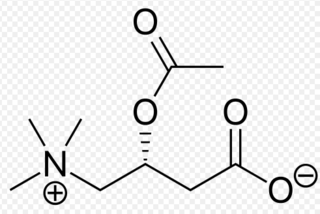Depression
Acetyl-l-carnitine and Depression: A New Biomarker?
This little molecule packs a powerful punch for nerve recovery and repair.
Posted September 11, 2018 Reviewed by Kaja Perina

One of the major complaints about psychiatric diagnoses is that there are no lab tests or x-ray findings to confirm a diagnosis, so we rely entirely upon an interview with the patient and certain key observations by the interviewer. Some people use this as an excuse to say that a clinical depression isn’t “real” or is based entirely in someone’s psychology rather than biology.
Of course a clinical depression is biological, and there are biomarkers, we just don’t often check them. For example, there are specific sleep patterns associated with depression that can be detected by a sleep study. Zinc levels also tend to be low in someone who is depressed. There are differences in circadian rhythm, hormones, and the microbiome as well, along with inflammatory markers that correlate with depression.

One new biomarker that may have some meaning for diagnosis and treatment is called acetyl-L-carnitine. This molecule is necessary for the hippocampus to work correctly. The hippocampus is a part of our brain that is responsible for major memory function, and can shrink in people with PTSD. In mouse studies, depressed mice have very low levels of acetyl-L-carnitine, but if they get a supplement, they bounce back to normal-acting mice again. They’ve even worked out the mechanism: Acetyl-L-carnitine helps with synaptic plasticity through modifying DNA expression and the production of the brain fertilizer, BDNF. Could the same be true in depressed humans?
Well, in a study of 116 depressed folks with matching controls, the amount of acetyl-L-carnitine was significantly lower in the depressed people. The more depressed the person was, the lower the acetyl-L-carnitine concentration, and the earlier the age of onset of the clinical depression, the lower the acetyl-L-cartnitine level. Folks with treatment-resistant major depression, meaning they did not respond to initial standard treatments, also had lower levels of the marker than others.
So how does acetyl-L-carnitine do its magic and why could a lack of it be correlated with depression? It turns out, acetyl-L-carnitine does a lot: It helps transport necessary fats to the energy-producing centers of the cell and also helps move the leftover exhaust molecules from energy production to be cleaned up and disposed of.
Does this mean that we should give depressed people a supplement of acetyl-L-carnitine? Well, not so fast. Vitamin D levels also tend to be low in people with depression and other illnesses, but supplementing vitamin D (unless the levels are very, very low to constitute an absolute deficiency) doesn’t seem to help. But acertyl-L-carnitine has been looked at as a remedy for depression many times in small studies over the years. There are studies of elderly folks with fibromyalgia, dementia and depression, and mild depressive symptoms who did benefit from the supplement, which was well tolerated. In fact, it worked as well as antidepressants in some studies with far fewer side effects, and it worked better in older people than in younger folks. It’s currently marketed for nerve pain, and it works quickly—within about three days. A larger, more definitive study would be nice, so for any research fellows out there in psychiatry, here’s an exciting option to present to the IRB!
Another question: Would straight carnitine supplementation also be useful for depression? In this study testing humans, free carnitine in the blood was not correlated with clinical depression. We absorb carnitine from food (primarily meat and dairy), but we can also make our own. You need carnitine and the enzyme carnitine acetyltransferase to make acetyl-L-carnitine. Why are the levels low in depression? It could be that less is made under stressful conditions for some reason, or that it is used up too quickly to be replenished. In any event, it may not make sense to take carnitine when acetyl-L-carnitine is inexpensive and readily available. Carnitine levels are lower in vegans, especially in children, but I couldn’t find any information about acetyl-L-carnitine levels in vegans (another good study for those research fellows out there).
Anyway, we could use a lot more tools in our armamentarium to help combat depression, especially those with few side effects that act quickly and work in the elderly. Acetyl-L-carnitine is a great molecule for further study. If you want to know more about what supplements do have data for use in depression, look at this blog post.
copyright Emily Deans MD


